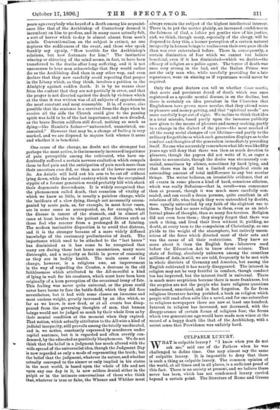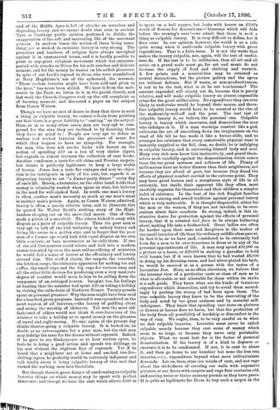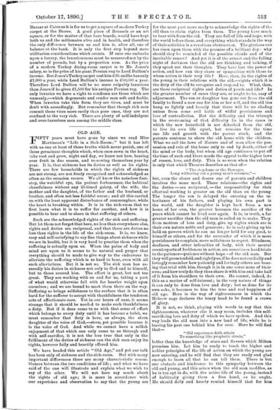CULPABLE LUXURY.
WHAT is culpable luxury ? "I kno-w when you do not ask me," said one of the Fathers when he was challenged to define time. One may almost say the same of culpable luxury. It is impossible to deny that there is such a thing as culpable luxury. The common opinion of the world, at all times and in all places, is a sufficient proof of this fact. There is no society at present, and we believe there never has been, which has not condemned luxury carried beyond a certain point. The literature of Rome and Greece And of the Middle Ages is full of attacks on senseless and degrading luxury, and we cannot doubt that even in ancient 'Tyre or Carthage public opinion professed to dislike the exaggeration of the soft and enervating life of the merchant princes. In modern times the notion of there being some- thing per se wioked in excessive luxury is very strong. The preachers and teachers of religion have always inveighed Against it in unmeasured terms, and it is hardly possible to point to any great religious movement which was unaccom- panied with attacks on Dives for his soft couches and delicate raiment, and for the money he wastes on his selfish pleasures. In spite of our Lord's reproof to those who were scandalised at Mary Magdalene's use of the spikenard, the murmur, 4' These useless luxuries might have been sold and given to the poor," has never been stilled. We hear it from the mob- orator in the Park, we listen to it in the parish church, and
• last week the Church Congress took up the old complaint as of burning moment, and discussed a paper on the subject from Canon Watson.
Though we have no sort of desire to deny that there is such a thing as culpable luxury, we cannot refrain from pointing out that there is a great liability to " canting " on the subject. Here, as in so many other cases, men are very apt to com- pound for the sins they are inclined to by damning those they have no mind to ! People are very apt to define as useless and wicked luxuries the pleasures of sense for which they happen to have no sympathy. For example, the man who does not smoke looks with horror on the notion of spending £10 on a box of very choice cigars, - tut regards as almost virtuous the collection of rare books. Another condemns a taste for old china and Persian carpets, tut thinks it perfectly legitimate to keep a large stable -of horses. Jones has a taste for vintages and sees no objec- tion to its indulgence in spite of the cost, but regards it as 'disgusting luxury to eat "a dinner-party dinner" every day 'of one's life. Brown, a teetotaler, on the other hand, holds that money is criminally wasted when spent on wine, but believes in the need for well-cooked food. In truth, one man's luxury is often another man's necessity as much as one man's meat
• is another man's poison. Again, as Canon Watson admitted, luxury is often a purely relative term, and to illustrate this " 'he quoted Sir Walter Scott's striking story of the High. ' landers sleeping out on the snow-clad moors. One of them made a pillow of a snowball. The others kicked it away with 'disgust as a piece of culpable luxury. Thus the poor man is -very apt to talk of the rich wallowing in unholy luxury and living like swine in a golden stye, and to forget that the poor - man of a former age would look with equal disgust on his own little comforts, or bare necessaries as he calla them. If one of the old Covenanters could return and look into a modern manse tenanted by even the most self-sacrificing of ministers -he would feel a sense of horror at the effeminacy and luxury around him. The stuffed chairs, the carpets, the coverlets, -the kitchen range, the elaborate apparatus for making tea and coffee, the small cups and the big cups for various uses, and all the other little devices for producing even a very moderate degree of comfort would seem to him to be calling down the vengeance of an outraged heaven. Imagine, too, his feelings at hearing that the minister had spent 220 on taking a holiday in visiting the cathedrals of Northern France. Twenty pounds -spent on personal pleasure! Why the sum might have been used for a hundred pious purposes. Instead it was squandered on the most wanton of all luxuries,—the luxury of gadding about and seeing the worship of idolators. Yet now the most old- -fashioned of elders would not think it over-luxurious of the -minister to take a holiday or to spend money on the pleasure --of travel and sight-seeing. No one, again, at the present day thinks theatre-going a culpable luxury. It is looked on, no doubt, as an extravagance for a poor man, but the rich man may indulge his taste for the drama without reproach. Indeed, if he goes to see Shakespeare or to hear serious opera, he feels he is doing a good action and spends ten shillings on 'his seat without the slightest fear of reproach. Yet if he beard that a neighbour sat at home and smoked two five-
• shilling cigars, he probably would be extremely indignant and -talk loudly about it being culpable luxury of this sort that turned the working men into Socialists.
But though there is great danger of condemning as culpable Auxuries things on which money may be spent with perfect innocence. and though we hate the cant which allows £500 to
be spent on a ball supper, but looks with horror on 2100's worth of flowers for decorations= blossoms which will fade before the evening's over '—we admit that there is such a thing as culpable luxury. It is very difficult to define, but it does exist. In our opinion, however, the world is as a rule quite wrong when it confounds culpable luxury with great expenditure. That is a false issue. It is not the waste that makes the luxury culpable, nor, again, will the test of useful- ness do. If the test is to be utilitarian, then all art and all music on a grand scale must go, for art and music do not increase the supply of food and clothing and warmth. A. few prints and a mnsical-box may be retained as mental distractions, but the picture gallery and the opera are without defence. But if waste, or non-productiveness, is not to be the test, what is to be our touchstone ? The amount expended will clearly not do, because this is purely relative, and will make culpable luxury an almost impossible crime for the great millionaires. No expenditure they are ever likely to undertake would be beyond their means, and there- fore culpable luxury would have to be counted as the vice of the moderately-well-off and the poor. The real test of culpable luxury is, we believe, the personal one. Culpable luxury is luxury which enervates, and demoralises the man who indulges in it. If a man worships comfort like it god, cultivates the art of smoothing down the ronghnesses on the road of life till he has made it like a butter-slide, and so arranges his existence that every conceivable physical want is instantly supplied to the full, then, no doubt, he is indulging in culpable luxury, and is enervating himself body and soul. Many very rich men know this instinctively, and guard them- selves most carefully against the demoralisation which comes from the too great easiness and softness of life. Plenty of millionaires have no better dinners than their neighbours, not because they are afraid of gout, but because they dread the effects of physical comfort carried to the extreme point. They may have great houses and a sumptuous style of life in all externals, but inside their apparent life they often most carefully organise for themselves and their children a simpler habit of existence. In the best of the rich English families there is a strong and sound tradition against personal luxury which is very noticeable. It is thought disgraceful, either for the men or the women, if they are .not invalids, to be over- zealous about their comforts. So strong, indeed, is this in- stinctive desire for protection against the effects of personal luxury, that it is counted bad form to be always bothering about making life into a feather-bed. Great ladies are often far harder upon their sons and daughters in the matter of the small luxuries of life than the ordinary middle-class parent. In fact it is, as we have said, considered to be extremely bad form for a man to be over-luxurious in dress or in any of the personal appointments of life. A man may spend 110,000 on a picture or a horse, or £20,000 in making a paradise to hold wild beasts, but if it were known that he had wasted 26,000 in doing up his dressing-room, and had silver-plated his bath, he would be sneered at as a person with the tastes of a Levantine Jew. Here, as so often elsewhere, we believe that the internal view of a particular caste or class of men as to what is allowable or not allowable for those within its ranks is a safe guide. They know what are the kinds of luxurious expenditure which demoralise, and try to avoid them accord- ingly by putting the stamp of bad form upon them. The true culpable luxury they know to be the enervating of the body and mind by too great easiness and by material self- indulgence. They know that spending vast sums on pictures or flowers or horses does no harm, but that the protection of the body from all possibility of hardship or discomfort is the way of ruin. We ought, then, to be very careful as to what we dub culpable luxuries. Luxuries must never be called culpable merely because they cost sums of money which seem to us large, or because they serve only perishable objects. What we must look for is the factor of personal demoralisation. If the luxury is of a kind to deprave or enervate it is to be condemned. If not, it is cant to abase it, and then go home to our humbler but none the less real luxuries,—i.e., expenditure beyond what mere utilitarianism demands. Let us, then, clear our minds of cant, and not rage about the wickedness of covering our walls with expensive pictures or our floors with carpets and rugs four centuries old, and costing twice or thrice as many pounds as they have years. It is quite as legitimate for Dives to buy such a carpet in the
Bazaar at Cairo as it is for us to get a square of modern Turkey carpet at the Stores. A good piece of Brussels or an art square, or for the matter of that bare boards, would have kept both us and the millionaire alive and in health, and therefore -the only difference between us and him is, after all, one of balance at the bank. It is only the first step beyond mere utilitarian considerations which counts. If once one embarks -upon a luxury, the luxuriousness must be measured not by the -number of pounds, but by a proportion sum. As the price -of a modern Turkey dining-room carpet is to Mr. Jones's salary, so is the price of his giant Persian rug to Lord Bullion's income. But Jones's Turkey carpet cost him 00, and he has only £1,000 a year, while Lord Bullion's income is 250,000 a year. Therefore Lord Bullion will be no more culpably luxurious than Jones if he gives 21,500 for his antique Persian rug. The only luxuries we have a right to condemn are those which are unmanly,—which degenerate and render men soft and feeble. When luxuries take this form they are vices, and must be -dealt with accordingly. But remember that though rich men commit these vices more easily than poor ones, they are not confined to the very rich. There are plenty of self-indulgent -and over-luxurious men among the middle class.








































 Previous page
Previous page